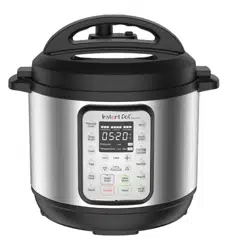Loading ...
Loading ...
Loading ...

instantpot.com.au | 15
Releasing pressure
You must release pressure after pressure
cooking before attempting to open the lid.
Follow your recipe’s instructions to choose a
venting method, and always wait until the float
valve drops into the lid before opening.
WARNING
Steam ejected from the steam release valve is hot.
DO NOT place hands, face, or any exposed skin over
the steam release valve when releasing pressure to
avoid risk of injury.
DO NOT cover the
steam release valve to
avoid risk of injury and/
or property damage.
DANGER
DO NOT attempt to remove the lid while the oat valve is up and NEVER
attempt to force the lid open. Contents are under extreme pressure. Float
valve must be down before attempting to remove the lid. Failure to follow
these instructions may result in serious personal injury and/or property damage.
Venting methods
• Natural Release (NR or NPR)
• Quick Release (QR or QPR)
• Timed Natural Release
Natural Release (NR or NPR)
Cooking stops gradually. As the temperature within the multi-cooker drops, the Instant
Pot depressurises naturally over time.
What to do What to expect
After cooking finishes, leave the quick release
switch in the Seal position until the float valve
drops into the lid.
Seal position
Your meal continues to cook even after the Smart Programme ends.
Instant Tip: This is called “carryover cooking”
or “resting”, and it’s great for large cuts of meat.
The depressurisation time may vary based upon the volume,
type and temperature of food and liquid. It can take up to
40 minutes with some dishes, so plan ahead — it’s well worth
the wait!
When pressure has been fully released, the float valve drops
into the lid.
NOTICE
Use NR to depressurise the multi-cooker after cooking high-starch foods
(e.g., soups, stews, chilis, pasta, oatmeal and congee) or after cooking foods
that expand when cooked (e.g., beans and grains).
Pressurised Depressurised
Loading ...
Loading ...
Loading ...
